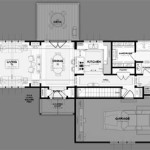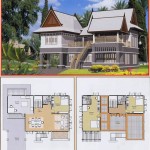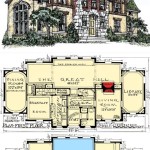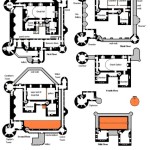House Plan According to Vastu Shastra
Vastu Shastra, an ancient Indian system of architecture and design, emphasizes harmonious relationships between human beings, nature, and the cosmos. Applying Vastu principles to house planning aims to create a balanced and auspicious living environment conducive to health, wealth, and prosperity. This article will delve into the key principles of Vastu Shastra as they pertain to house planning, offering insights into creating a home that aligns with natural energies and promotes well-being.
Understanding the Five Elements
Vastu Shastra's foundation lies in the concept of the five elements - earth, water, fire, air, and space. These elements are believed to influence every aspect of life, including our homes. According to Vastu, each element has a specific direction and quality, and a balanced presence of these elements in a house is crucial for positive energy flow.
The five elements and their corresponding directions are:
- Earth (Prithvi): Represents stability, represents the Southwest direction.
- Water (Jal): Represents fluidity and abundance, represents the North direction.
- Fire (Agni): Represents energy and passion, represents the Southeast direction.
- Air (Vayu): Represents movement and communication, represents the Northwest direction.
- Space (Akasha): Represents expansiveness and spirituality, represents the Zenith direction.
Key Vastu Principles for House Planning
Several principles guide the design and construction of a Vastu-compliant house. These principles aim to ensure a harmonious flow of energy and promote a positive living environment.
1. Direction and Zone Allocation
Each direction in a house is associated with a particular element and influences specific aspects of life. For instance, the Northeast, representing the element of water, is considered ideal for the kitchen due to its connection with nourishment and abundance. The South, associated with the fire element, is generally suitable for bedrooms as it promotes energy and vitality. It is crucial to carefully allocate rooms and spaces based on their associated energies and potential impact on the occupants' well-being.
2. Shape and Geometry
The shape and geometry of a house significantly influence the flow of energy within it. A square or rectangular plan, representing balance and stability, is considered auspicious in Vastu. Avoid sharp corners or irregular shapes as they can disrupt energy flow and create negative influences. The principle of Golden Mean, a mathematical ratio present in nature, is also incorporated to create harmonious proportions in the house layout for a balanced energy environment.
3. Entrance and Main Door
The entrance is the primary point of energy entry into a house. A well-designed entrance, according to Vastu principles, can attract positive energy and prosperity. Ideally, the main door should face the north, east, or northeast directions, representing auspicious energies of growth, wealth, and knowledge. The door should be sturdy and well-maintained, and avoid obstructive elements such as sharp corners or clutter near the entrance.
4. Placement of Rooms and Objects
Vastu emphasizes the importance of the placement of rooms and objects within a house. For instance, the master bedroom should ideally be located in the southwest direction, representing stability and grounding. Kitchen placement in the southeast direction is considered auspicious for abundance and prosperity. The placement of staircases, bathrooms, and other essential elements should be planned in alignment with Vastu guidelines for a positive and healthy living environment.
Benefits of a Vastu-compliant House
Adhering to Vastu principles in house planning offers numerous potential benefits, including:
- Improved Health and Well-being: A balanced energy flow in the house can promote physical and mental well-being, reducing stress and fostering a sense of harmony.
- Financial Prosperity: Vastu suggests that by aligning the house plan with natural energies, one can attract abundance and prosperity in their life.
- Harmonious Relationships: A positive energy flow in the house can contribute to improved family relationships and stronger bonds.
- Spiritual Growth: Vastu practices emphasize the connection between humans and nature, leading to a deeper sense of connection with oneself and the cosmos.
While Vastu Shastra offers valuable insights into creating a harmonious and auspicious living environment, it is important to approach it with an open mind and a holistic perspective. Consulting with a qualified Vastu expert can provide personalized guidance and help you implement Vastu principles effectively in your house plan.

Vastu Model Floor Plans For North Direction

House Plan According To Vastu Shastra N Plans Luxury

Vastu Shastra For Building Construction Benefits Tips And Limitations

The Science Of Vastu Shastra Way To Plan Your House Happho

27 Best East Facing House Plans As Per Vastu Shastra Civilengi One Floor 2bhk Plan

Vastu Model Floor Plans For South Direction

Vastu Model Floor Plan For East Direction

House Plans As Per Vastu Shastra 400 Various Land Sizes Of Available Inside Paperback Com

Vastu For House Plan And Design

27 Best East Facing House Plans As Per Vastu Shastra Civilengi N Three Bedroom Plan








